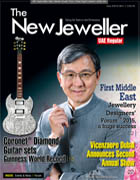
 |
|
| Home Technology / Education Events & News Archives Designs e - NewsLetter |
|
Sodiam C.A.R. responds to Amnesty International’s diamond report Sodiam C.A.R. (Société Centrafricaine Du Diamant) has responded to the report “Chains of Abuse” published recently by Amnesty International describing it as failing to take account of the realities of the diamond industry and as reflecting a politically motivated agenda. The report, which focused on the global diamond supply chain, included criticisms of Sodiam C.A.R.’s activities since the suspension of the Kimberley Process in the Central African Republic and alleged that the company had failed to ensure that all diamonds entering the supply chain were acquired from bona fide sources. On this basis, Amnesty suggested that Sodiam’s current stock be confiscated. Sodiam C.A.R.’s spokesman Filip Van Laere rejected these criticisms and emphasised the extent to which the company had acted to ensure that all the diamonds it purchased were acquired lawfully and that its due diligence procedures were at all times such as placed it within the requirements of the Kimberley Process and of international and domestic law. He also said: “We regret that Amnesty’s report simply does not reflect the realities of the diamond industry and that it fails to take account of the very great care taken by Sodiam C.A.R. to make sure that it only ever purchased goods from sources having no connection with armed groups. It was clear that Amnesty had already written its report before it even asked us for our input and that it was unwilling to allow the evidence that our lawyers produced to deflect it from the conclusions we feel it had already decided to reach.” Mr Van Laere continued: “Sodiam C.A.R. has worked closely with the Government of the CAR since the Kimberley Process was suspended. It has conducted itself at all times in accordance with the Kimberley Process and has stocked its purchases securely under Government supervision. It made samples available to the Kimberley Process to enable the latter to develop a geochemical fingerprint for the CAR and also arranged for an independent audit of the stock it purchased during the period of the suspension to be carried out by Martello Risk (a company owned by Alexander Yearsley, formerly Head of Special Projects at the prominent ngo Global Witness). This audit, which demonstrated the provenance of all purchases made by Sodiam C.A.R. during the period in question and established that the company had always made traceable and lawful purchases, was in the public domain (it appears on Sodiam C.A.R.’s website at http://sodiam.cf) and was drawn specifically to Amnesty’s attention before Amnesty published its report. Sodiam C.A.R. is content for a further counter-audit to be conducted in order to demonstrate the validity of this first audit. In this context, the suggestion that Sodiam C.A.R.’s entire stock might be confiscated is outrageous and is not justified by anything the company has done or failed to do.” Sodiam C.A.R. draws particular attention to the following matters: 1. Immediately following the suspension of the Kimberley Process (which embargoed exports but not the internal trade in diamonds in the CAR), Sodiam C.A.R. took advice from the Ministry of Mines and, on the basis of that advice, thereafter determined to keep all eastern goods it bought separate from those it purchased in the western region. It maintained this policy stringently until it closed its offices in Bria and Sam Ouandja and ceased purchasing diamonds from the east altogether. By doing so, it was able to ensure that it fully respected the requirements of the Kimberley Process.
4. In order to be able to differentiate further between diamonds from the west and those from the east, the WGDE requested that the Government of the CAR send samples of both eastern and western goods to Mintek in South Africa under embargo exemption for analysis. The CAR Government asked Sodiam C.A.R. to make such samples available to the WGDE and it did so. |